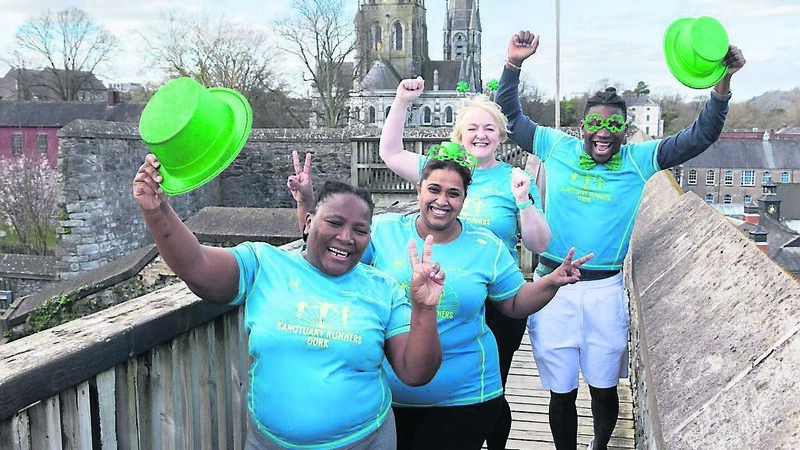St Patrick’s Day is a global hit because of our migrant history

Will you be marking the day in a more muted way, or are you someone that constantly despairs at the state of the nation and will spend the 17th of March rolling your eyes at the shenanigans?
It can feel a bit strange to be celebrating all things Irish in the midst of a housing crisis, climate crisis and health service crisis.
Ireland as a nation is clearly dysfunctional in how it manages so many aspects of life. We have failed to provide enough housing for almost 12,000 of our citizens, and with the recent ending of the eviction ban, experts say the situation is going to get worse.
The lack of housing for our growing population, along with the acute challenge of accommodating Ukrainian refugees, has helped stoke populist ideology. The scenes of far right protestors confidently spouting anti-immigration sentiments on the Grand Parade a few weeks ago was deeply chilling for anyone who believes people seeking shelter from all manner of atrocities should be minded.
This Friday, the Grand Parade will be a sea of green as people gather to celebrate St Patrick’s Day, admire the variety of floats, marvel at the stilt-walkers and cheer the groups and multicultural communities that make up the tapestry of Cork city.
Representatives of Sanctuary Runners, a solidarity-through-sport initiative which uses running, jogging and walking to bring together asylum-seekers, refugees, migrants and all Irish residents, will be the Grand Marshals of the Cork parade, which is a clear statement that everyone is welcome to make this city their home by the Lee.
Around 70 million people around the world are Irish-born or of Irish descent. One in two people born in Ireland in the 19th century emigrated. In the 1950s, approximately half a million left the Irish republic, and many of us have family members who left in the 1980s, and again after the economic crash of 2008.
In his 1963 visit to Ireland, President John F Kennedy said: “Most countries send out oil or iron, steel or gold, or some other crop, but Ireland has had only one export and that is its people.”
Irish people have been leaving the shores of our beset island for hundreds of years, seeking safety, shelter and the welcome of strangers.
There is such sad irony to see protesters in Ireland promoting anti-immigration policy, when Irish people have long been ‘flooding’ other countries.
“Give me your tired, your poor, your huddled masses yearning to breathe free, the wretched refuse of your teeming shore. Send these, the homeless, the tempest-tossed to me.” So says the poem cast on a plaque on New York’s Statue of Liberty, the iconic figure symbolising freedom and providing a welcome to arriving emigrants.
America thrived on the diversity of its immigrants, who built and grew the nation. That poem could be dedicated about the millions of Irish who left during the Famine years simply hoping to survive, or those who left for an easier life during years of high unemployment and low prospects.
Those who argue that “Ireland is full” or that we “need to take care of our own first” must remember that Ireland’s broken housing and health system is not the fault of women and children from Kabul or Kharhiv.
We are a wealthy nation and should be able to mind people from Ireland and people fleeing war.
Rather than seeing so-called “unvetted males’’ as a potential threat, see them as prospective friends, neighbours and colleagues. See them as human beings who have survived unimaginable trauma, who through the support and comfort of Ireland can live happy, productive lives.
Ireland prides itself on being the country of a thousand welcomes. Pre-pandemic, more than 11 million overseas tourists came to Ireland every year and one of the top reasons cited for visiting is our reputation of friendliness.
Is this genuine hospitality and generosity, or just a tourism marketing ploy? I believe the enormous effort in the last 12 months to welcome and integrate Ukrainian refugees shows that openness and empathy is deep and sincere.
If you go to see a parade this week, remember that the first parade to mark St Patrick’s Day was actually marched in what is now Florida more than 400 years ago. It was organised by an Irish priest.
The tradition of the St Patrick’s Day parade was created by immigrants. Those Irish immigrants would scarcely believe the transformation in Ireland’s fortunes today, but all our achievements will pale if we forget the history of our ancestors and fail to step up to return the favour to the “huddled masses” who need Ireland’s assistance now.
What is the point of our success if we can’t do the basics of extending a welcome to those who desperately need it.
So, Lá Fhéile Pádraig shona duit agus Céad Míle Fáilte le gach duine.







 App?
App?




